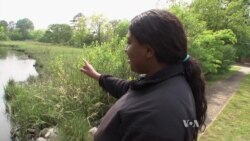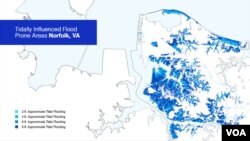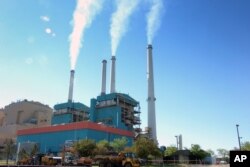Signs of climate change are poking up through the lawn in southeastern Virginia's coastal Hampton Roads region.
Skip Stiles points to a leafy green seedling growing taller than the mowed grass in the manicured front yard of a handsome Norfolk home near one of the city's many inlets.
"Saltbush. It grows at the upper edge of the tidal range," he said. Stiles heads Wetlands Watch, a local environmental group. In khaki pants and a plaid shirt, the gray-haired Stiles belongs in an L.L. Bean clothing catalog.
Stiles says the water's edge is moving deeper into the neighborhood as sea level rises. Flooding is a growing problem.
"The houses are elevated," Stiles points out. "The sidewalks are discolored. You look down and you can see the change in vegetation. It's starting to convert to marsh grass."
Rising waters
While skepticism and outright denial of climate change dominate the national Republican party, the marsh grass is hard to deny.
"Hampton Roads is ground zero for coastal flooding and sea level rise here in the United States," says Ron Villanueva, a Republican state delegate from Virginia Beach, also in the Hampton Roads region.
Bordered by the Atlantic Ocean, the Chesapeake Bay and the James River, Hampton Roads faces the double threat of rising water and sinking land. The tide is rising by about two inches a year at Sewells Point in Norfolk. Sea level rise accounts for about one-third of that.
It doesn't sound like much. But "nuisance flooding," which closes roads, overwhelms storm drains and corrodes infrastructure, is up 325 percent in the last half-century. Norfolk is in the top 10 U.S. cities for increased nuisance flooding.
And it's expected to get worse. While the land will continue to sink at the same rate, the ocean is rising faster. At least another 1.5 feet is expected to go underwater by the end of this century, and possibly as much as 7.5 feet.
It's not just homes at risk. The nation's sixth-largest container port and the world's largest naval base are located here.
Defending it all against climate change is going to cost a fortune. It's not entirely clear how much. Studies are underway. But figures in the billions are tossed around.
It's going to take state and federal government help, Stiles said. "There isn't enough money in anybody's local tax base to fix this problem."
'Recurrent flooding,' not climate change
Villanueva has a suggestion that is unusual for a Republican. Nine northeastern states are charging their power plants for their greenhouse gas emissions. They have collected about $2 billion since 2009 and invested it in energy efficiency, renewable power, low-income assistance and more.
It's known as a cap-and-trade program. Economists say the same market-based approach has been successful in tackling other pollution problems, beginning with acid rain.
"It was championed long ago by Republicans," Villanueva said. "Now it's championed by Democrats."
Democrats tried to pass a national version when they controlled Congress in 2010. Republicans said it would wreck the economy and blocked it. Since then, the Republican-controlled Congress has opposed action to address climate change.
And at the state level, the Virginia legislature won't even call the problem "sea level rise."
"The term that's used in Virginia is 'recurrent flooding,'" said Michelle Covi, a professor in the Climate Change and Sea Level Rise Initiative at Old Dominion University in Norfolk.
The phrase "sea level rise" is linked to climate change in a way that creates friction in the statehouse.
"As soon as you say those words, 'climate change,' people fall into their ideological groups," Covi said.
Problem outpacing solutions
Villanueva is cagey on where he stands on climate change.
But, he added, "The bottom line is, if you believe in climate change or not, someone's going to have to pay for helping to fix these things."
In the last two legislative sessions, Villanueva has introduced a bill that would add Virginia to the nine-state cap-and-trade program. The revenue raised would help pay to adapt the region to rising waters. It also would direct funds to help communities in the state's southwestern coalfields that are struggling through the industry's downturn.
The bill failed both times. Villanueva says he'll try again next session.
No other Republican delegates contacted for this story would comment on Villanueva's bill or alternatives.
Still, Stiles sees signs of progress. The issue has "gone through a number of stages," he said. "People didn't want to talk about it. Then they wanted to argue about it. But in the last couple years, most local governments now are going, 'Alright, I get it. What do I do? Where do I get the money?'"
Building the necessary infrastructure will take years, however. "The solution is not keeping pace with the problem," he said. "And that's what really worries me."







